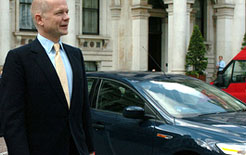
By Ralph Morton, editor
William Hague – minister without governmental car.
The Foreign Secretary has been cut adrift from his own ministerial car thanks to budget cuts by the Government Car Service fleet: the fleet of cars has been reduced from 78 vehicles to just 13 in an effort to cut costs for the benefit of us taxpayers.
So, from now on, William Hague will have to use public transport; or a pool car.
Now we all know what public transport is – but a pool car?
If you’re a business car manager of an SME’s small fleet of cars, a pool car can be used to provide ‘on demand’ transport for those staff who don’t have company cars.
They are very useful and provide welcome mobility. Essentially a pool car is an unallocated company car.
Having a pool car also means you don’t need to ask a staffer to use their own car on business – and check that they have the appropriate business car insurance, the car is properly roadworthy, and so on.
You’ll still need to check the driving licences of those staff who do use the pool car as your business will be liable should there be an accident. But apart from keeping the pool car insured that is it.
But there is an important distinction between a pool car and company car. For a pool car not to avoid benefit in kind company car taxation for the user and Class 1 National Insurance contributions for the business, the HMRC says it must meet the following conditions:
- used by more than one employee
- not ordinarily used by one employee to the exclusion of others
- not normally kept at or near employees’ homes
- used only for business journeys – private use is only permitted if it is merely incidental to a business journey (for example, commuting home with the car to allow an early start to a business journey the next morning)
How to run a pool cars
As the Foreign Office will soon start to learn on Mr Hague’s behalf, you need a booking in system. So the car is where it should be when it’s required by the person authorised by one of your business directors – or the business car manager – to drive the car.
You should record what the journey is for, who is driving the car, and a summary of the car’s condition should it get damaged.
The other thing you’ll need is someone to manage the pool car – because pool cars soon become the Harry Hack of the business if no one cares for the car and it soon becomes tatty, with scratches, scuffs and dirty interiors. It may also permanently be running on petrol fumes if there’s not a proper system of fuel reimbursement.
The verdict on pool cars
A useful tool for any small firm or SME business that has a constant requirement to keep staff mobile on an occasional basis but don’t want to invest in long term company cars. But beware the drawbacks of managing the pool car – and consider whether daily rental or a car club might not be a more effective way of providing business car mobility.
Alternatively, as many minister are now discovering thanks to the ministerial fleet car cut backs, there’s always the option of public transport. Ask William Hague.
Photo credit: flickr.com/foreignoffice







